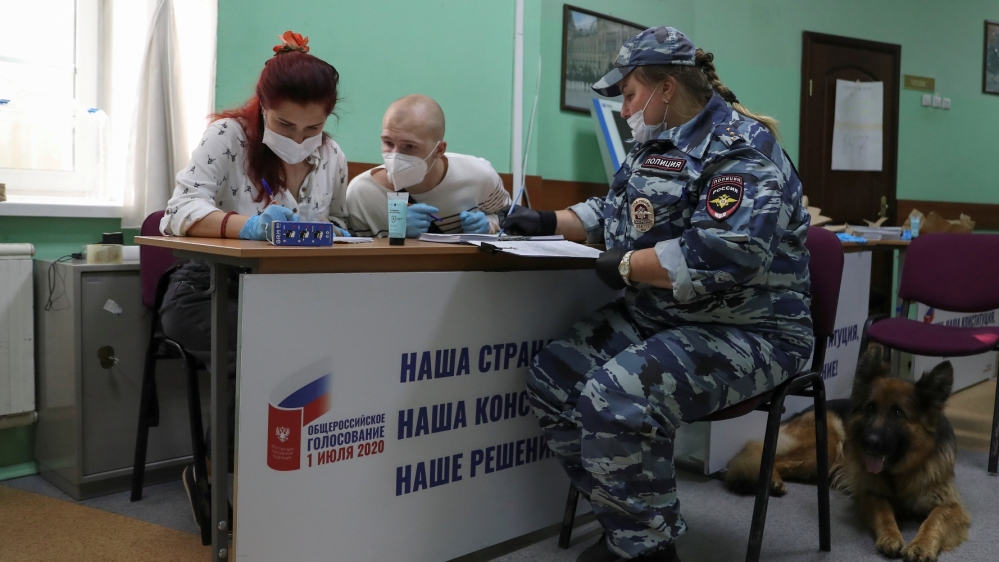Marathon vote on extending Putin’s rule set to begin in Russia
Poll is taking place despite concerns over the safety of people voting amid the coronavirus pandemic.

Russians on Thursday will begin casting their ballots in a seven-day vote on sweeping reforms that could clear the way for President Vladimir Putin to remain in power until 2036 in an exercise that critics have called a constitutional coup.
The vote is taking place despite concerns in opposition circles over the safety of people voting amid the coronavirus pandemic, worries over voter fraud and criticism that Putin, 67, has already spent too long in power.
Election officials say they are opening polls ahead of the official July 1 vote to avoid overcrowding that could spread COVID-19. Masks and disinfectant gels are being made available to 110 million voters across 10 time zones, from the Kaliningrad exclave on the Baltic Sea to Petropavlovsk-Kamchatsky on the Pacific Ocean.
The vote was initially scheduled for April 22, but the Kremlin postponed the poll as infections increased.
On Wednesday, Russia’s coronavirus cases surged past 600,000, the third-highest number in the world. The country continues to report thousands of new infections every day, although authorities say the outbreak is on the wane.
If, as expected, the constitutional changes are approved, Putin would be able to run for two more back-to-back six-year terms after his current one expires in 2024.

The former KGB operative has been in power as either president or prime minister since 1999 and has not ruled out running again, but says he has not taken a final decision.
Critics believe he intends to cling to power like elderly Soviet leader Leonid Brezhnev who died in office.
‘Dangerous for your health’
Opposition politician Alexei Navalny has previously condemned the vote as a populist ploy designed to give Putin the right to be “president for life”, calling it a “violation of the constitution, a coup”.
On Wednesday, Navalny called on his supporters to boycott the vote.
“Voting on the amendments is illegal, pointless and dangerous for your health,” Navalny wrote before the vote. “You can boycott it. That would be the right and honest thing to do.”
The Communist Party, which traditionally supports Putin on all major issues, has also come out against the constitutional changes.
Gennady Zyuganov, the party’s veteran leader, has said that Putin already has “more powers than a tsar, a pharaoh and a Communist Party general secretary combined”.
Others believe Putin is keeping his options open so as not to become a lame duck ahead of 2024 and may yet still hand over the reins to a handpicked but currently unknown successor.
“Since the president did not find a successor, he appointed himself,” Andrei Kolesnikov, a senior fellow at Carnegie’s Moscow Center think tank, told Reuters news agency.

Putin said on Sunday he was keen to shut down speculation about a possible successor to stop the government machine from getting distracted.
“If this doesn’t happen, then in about two years – and I know this from personal experience – the normal rhythm of work of many parts of government will be replaced by a search for possible successors,” Interfax news agency cited him as saying.
“We must be working, not looking for successors,” he said.
Constitutional changes
Supported by state media and facing no immediate threat from a divided opposition, the vote, which is on a large bundle of constitutional changes, is expected to go Putin’s way despite rising unemployment, the coronavirus-battered economy and no real prospect of an economic upswing anytime soon.
Putin’s approval rating is at 59 percent, according to independent pollster Levada, whose surveys the Kremlin has said it is not inclined to trust. Although high by most countries’ standards, it is at its lowest since 1999. State pollsters put his popularity at just over 60 percent.
The central bank forecasts a 4-6 percent drop in GDP this year, while the International Monetary Fund projects a 6.6 percent decline. Experts from state pollster VTsIOM have forecast that between 67 percent and 71 percent of voters will endorse the constitutional changes anyway.
On top of resetting Putin’s term limits, the reforms would consolidate presidential powers by allowing him to nominate top judges and prosecutors for approval by the upper house of parliament.
The reforms also enshrine economic changes that guarantee the minimum wage will be no less than the minimum subsistence level while the state pension will be adjusted annually to inflation.
They include a mention of Russians’ “faith in God” despite a long history as a secular country, and a stipulation effectively banning gay marriage. These principles are at the heart of the conservative and patriotic value system regularly touted by Putin.